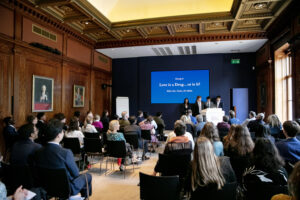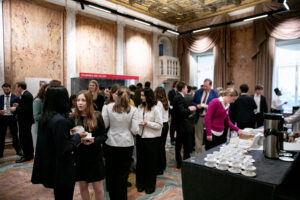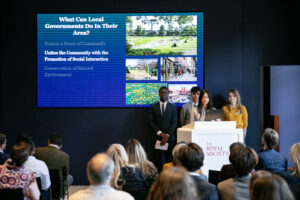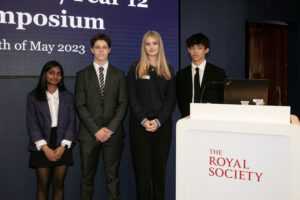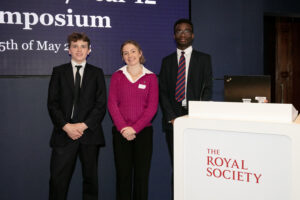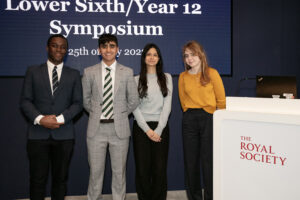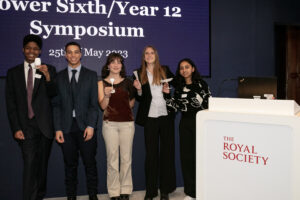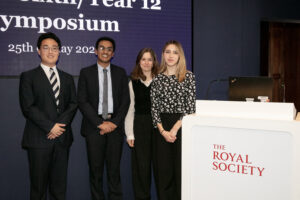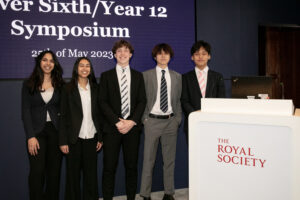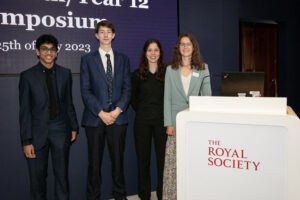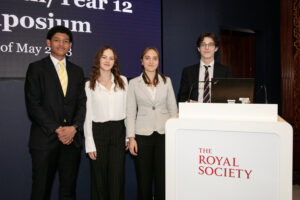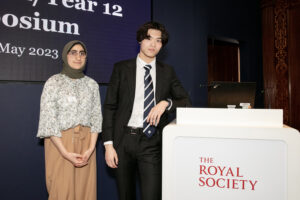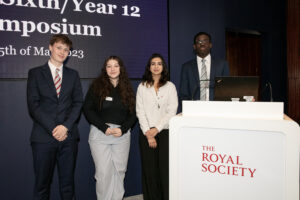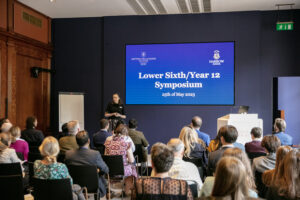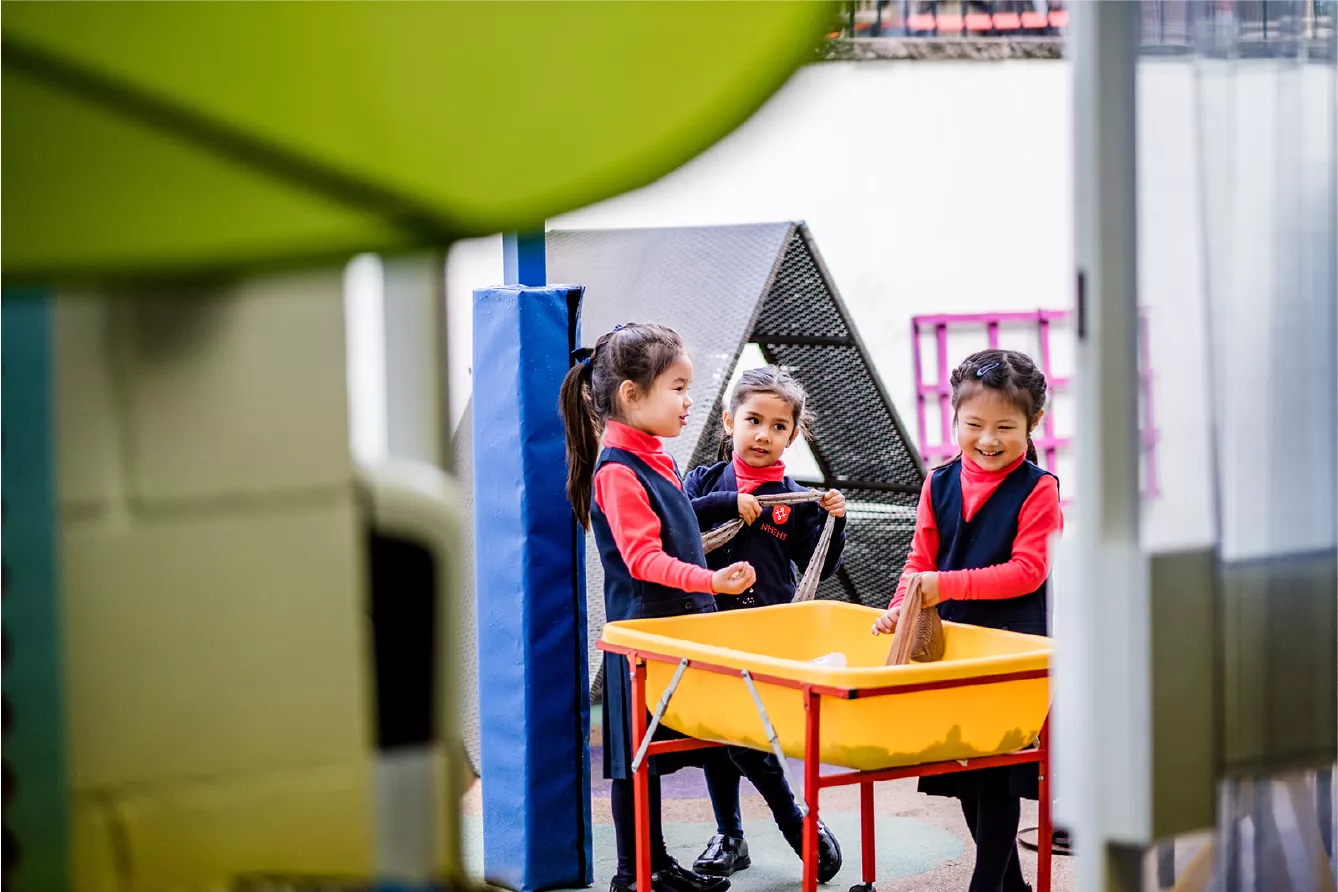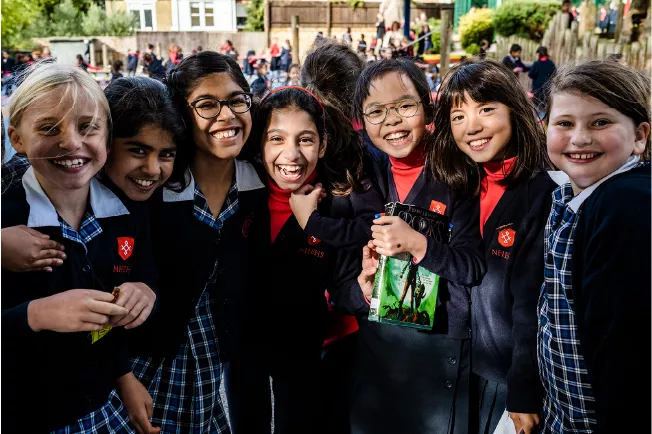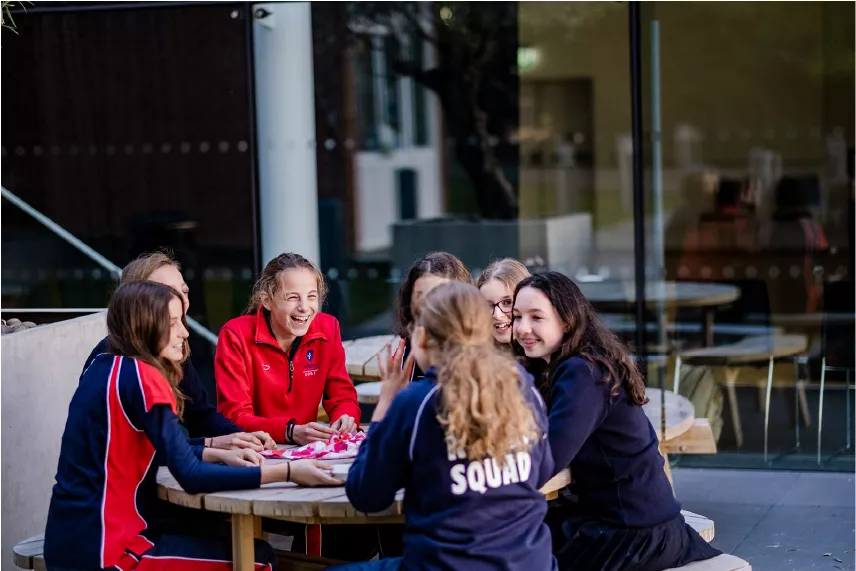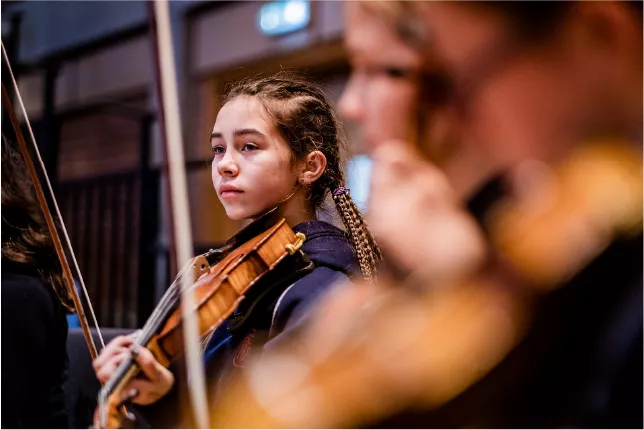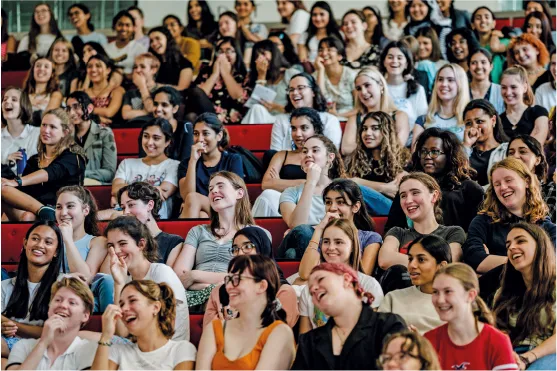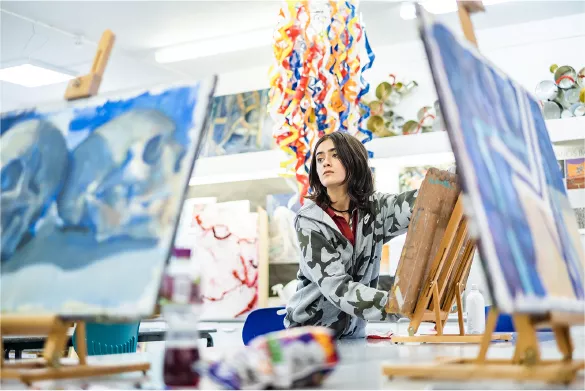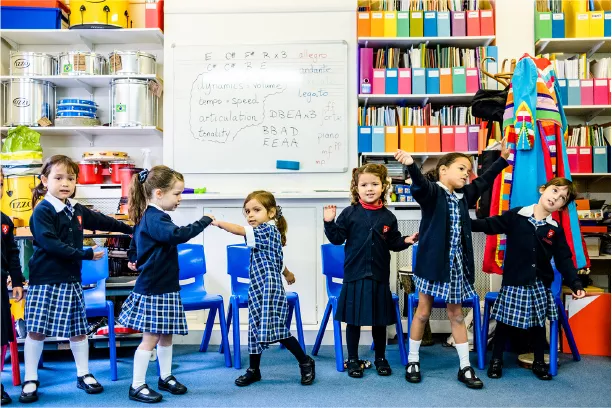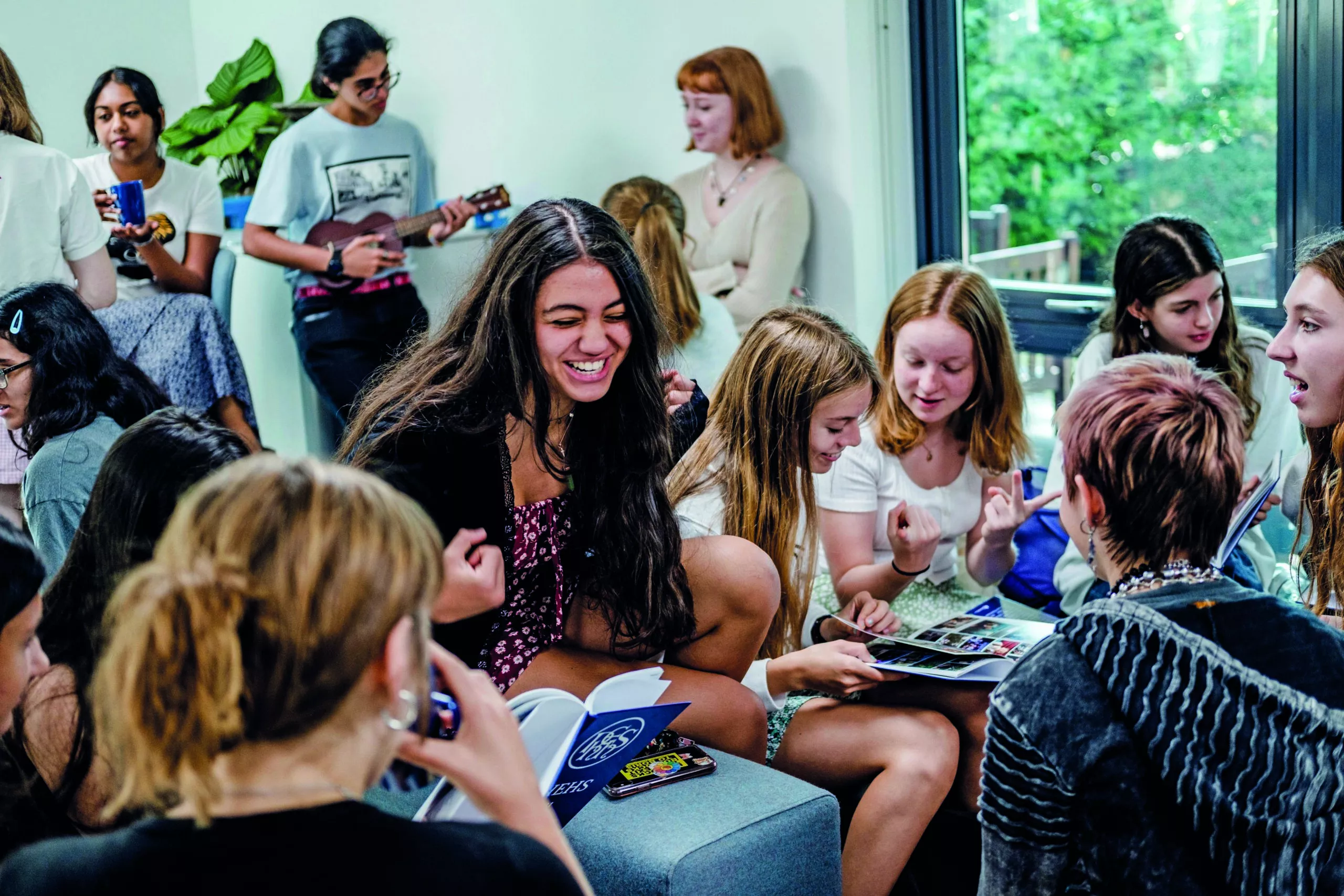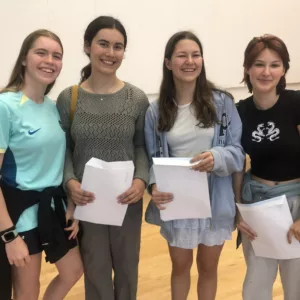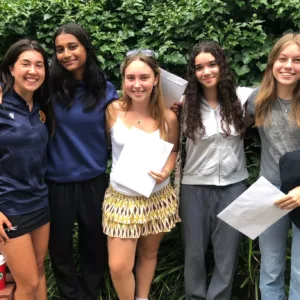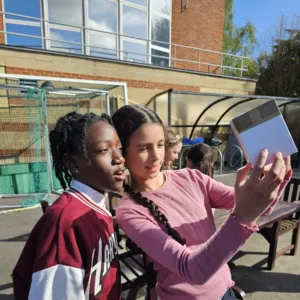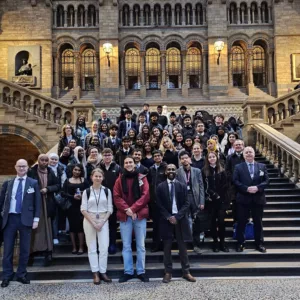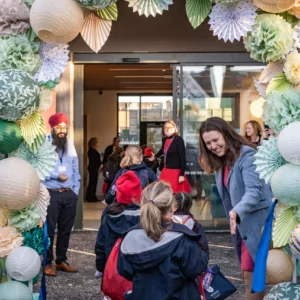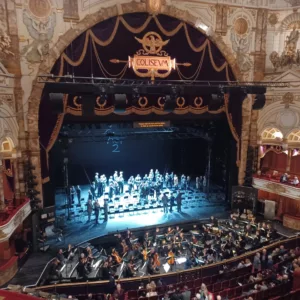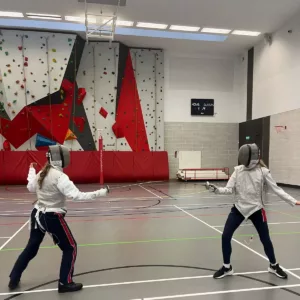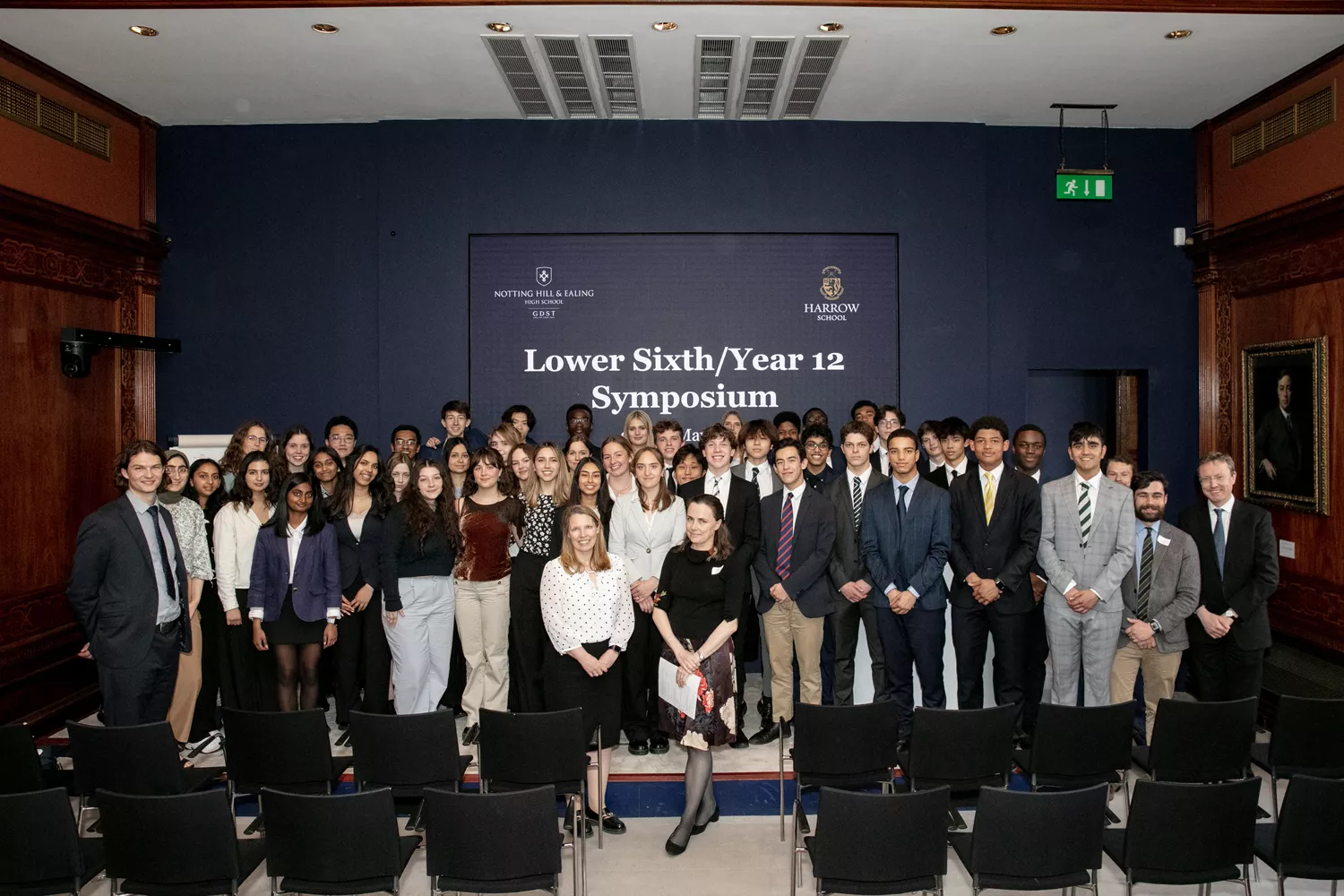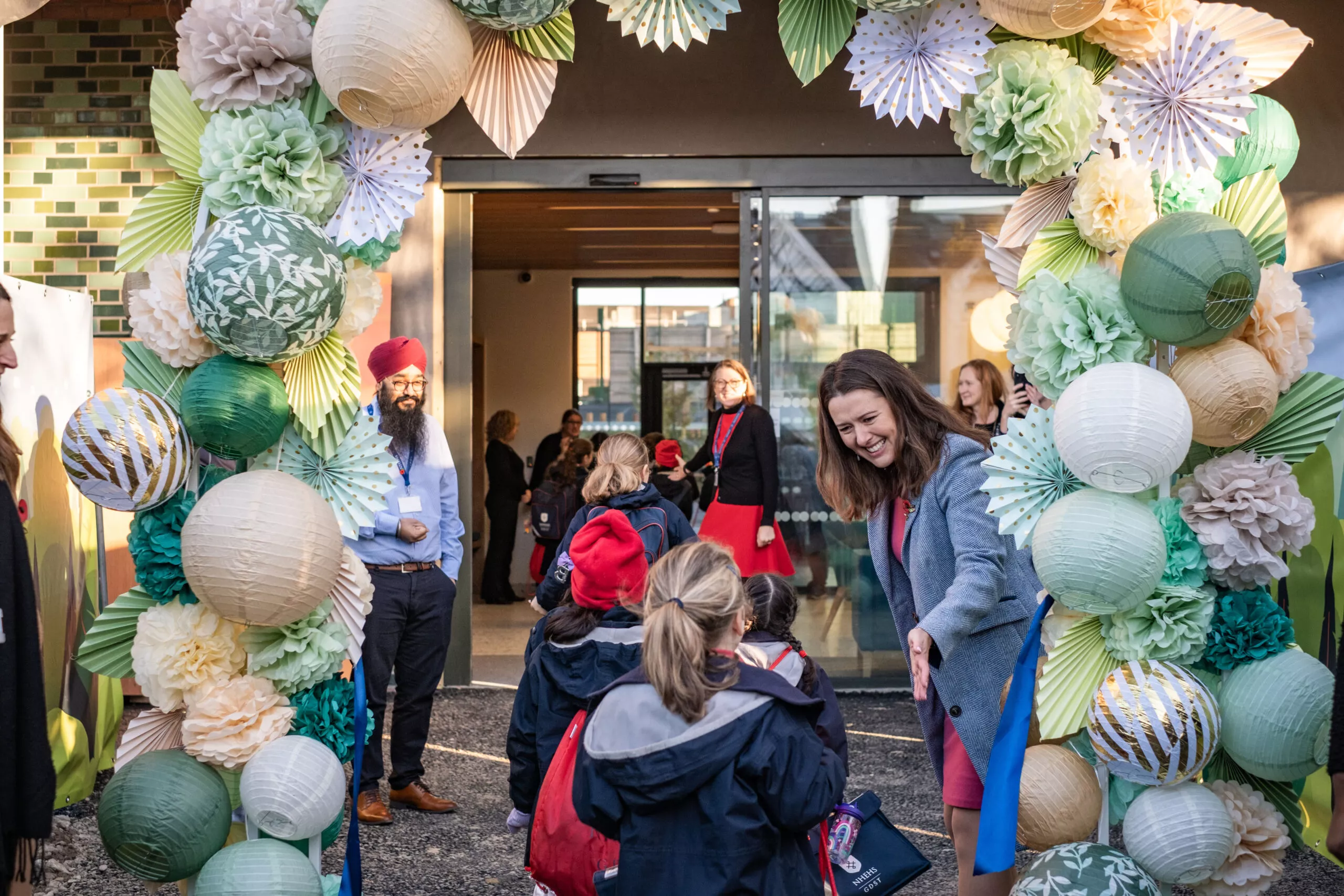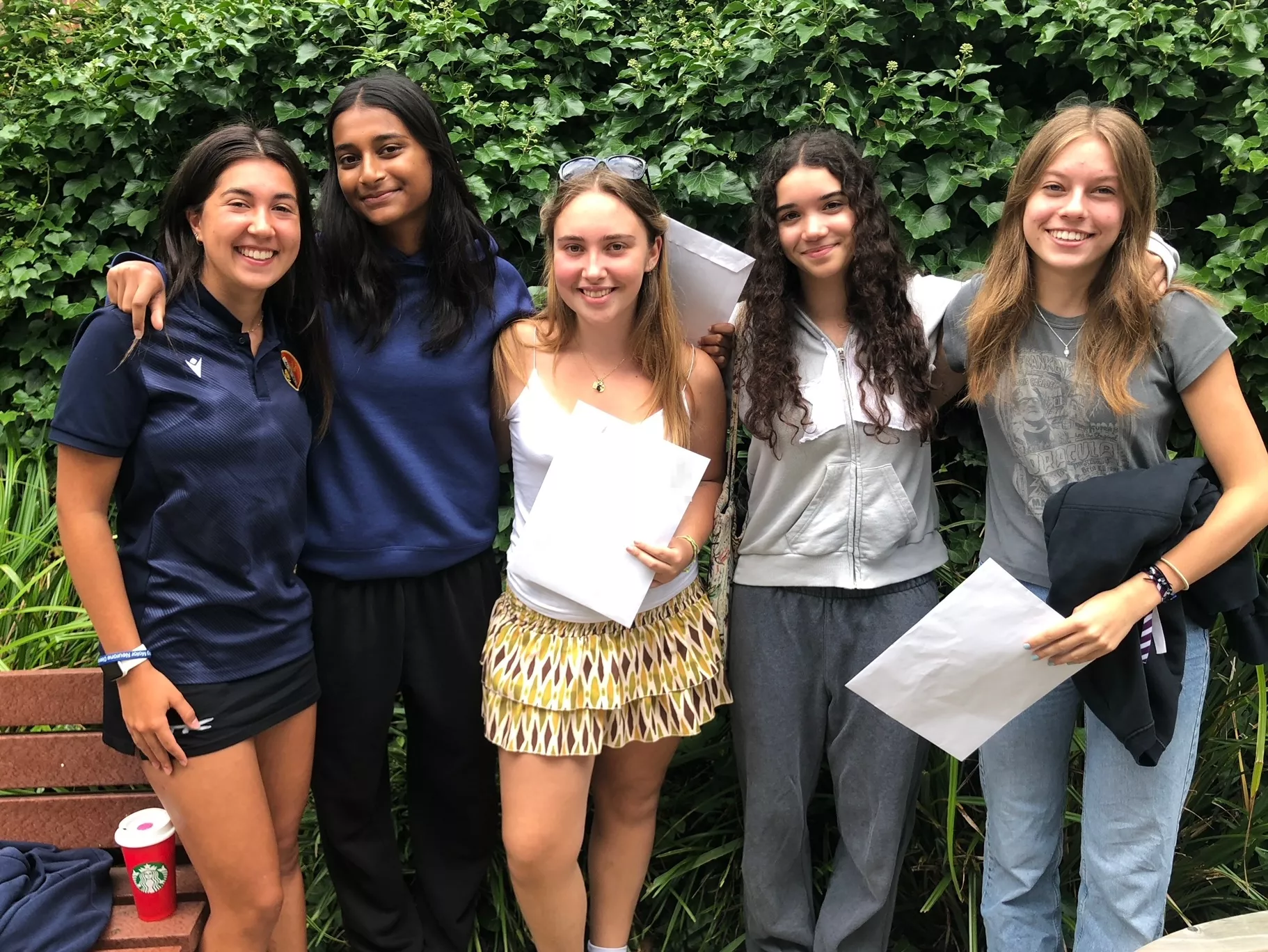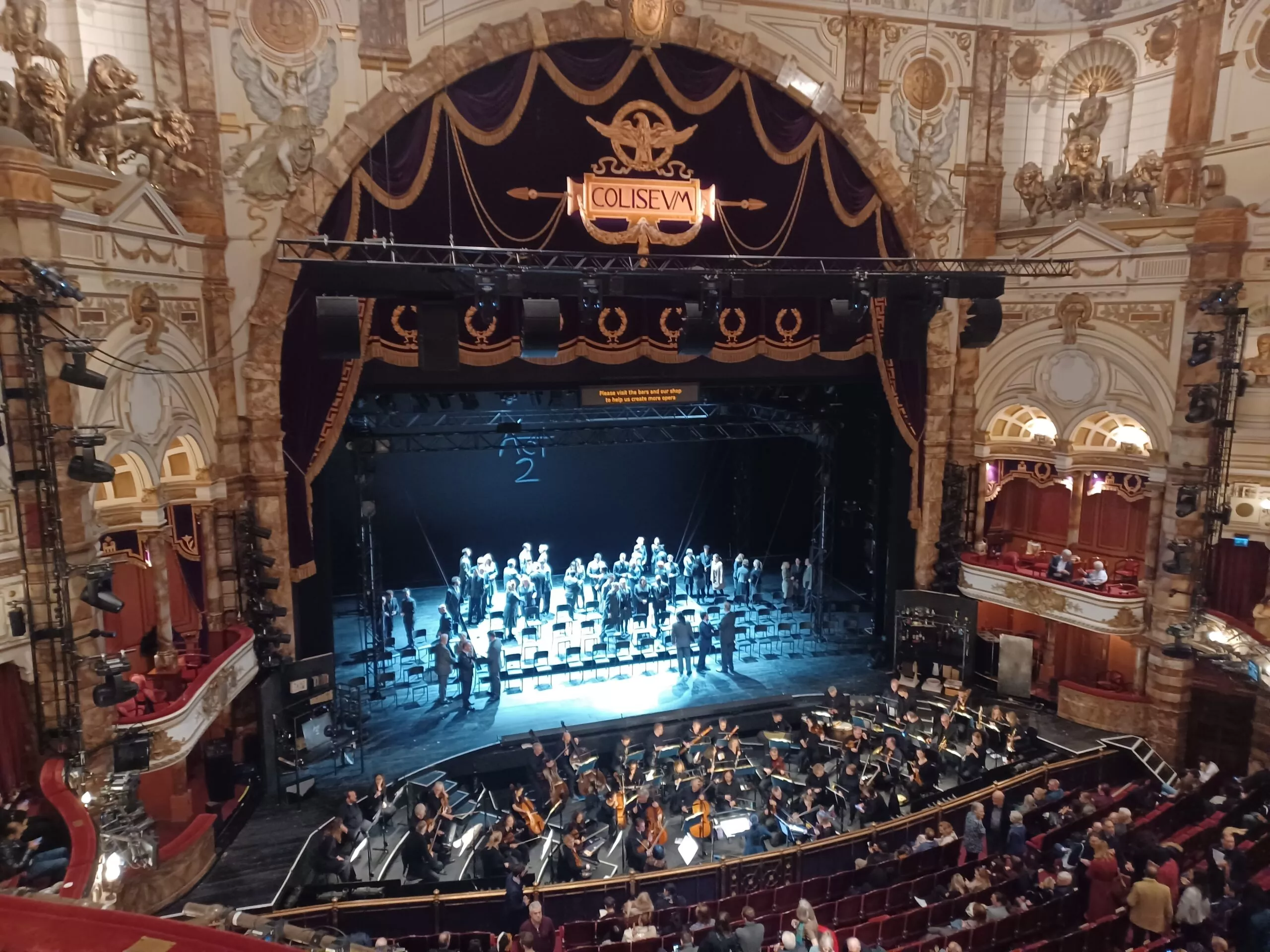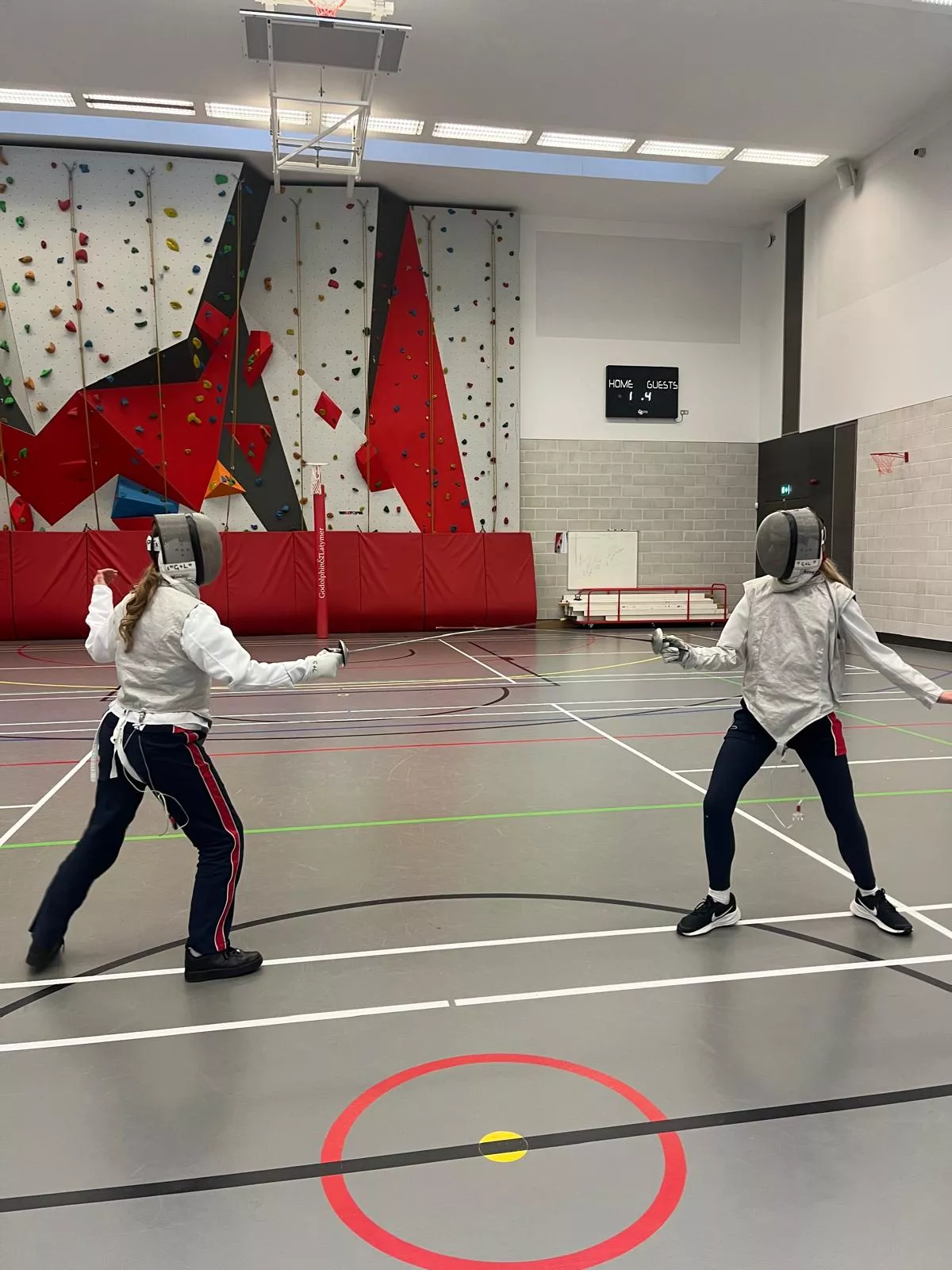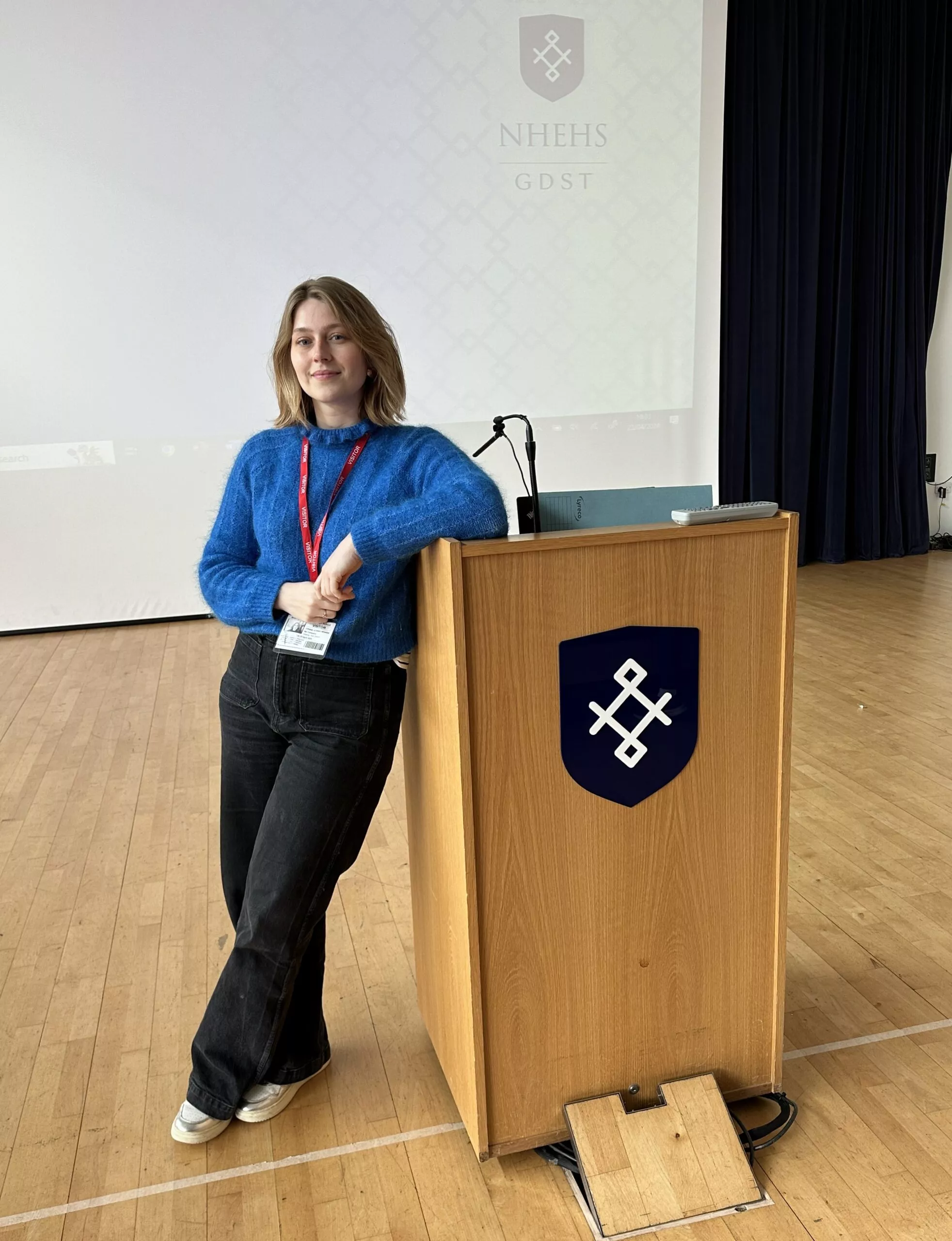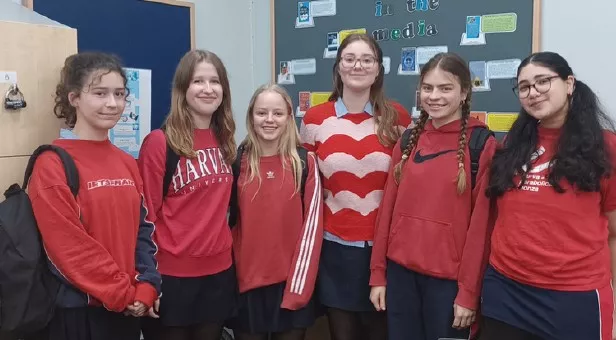O Tell Me the Truth About Love: An Interdisciplinary Adventure
 On the 25th May, The Royal Society hosted 21 boys from Harrow School’s Lower Sixth and 22 girls from Notting Hill & Ealing High School for an interdisciplinary symposium titled ‘O Tell Me the Truth about Love’. Divided into 11 groups and tasked with exploring love through a range of disciplines, the students worked collaboratively between March and May to produce a collection of truly outstanding and academically rigorous papers on their selected topic. A brief summary of each presentation can be read below.
On the 25th May, The Royal Society hosted 21 boys from Harrow School’s Lower Sixth and 22 girls from Notting Hill & Ealing High School for an interdisciplinary symposium titled ‘O Tell Me the Truth about Love’. Divided into 11 groups and tasked with exploring love through a range of disciplines, the students worked collaboratively between March and May to produce a collection of truly outstanding and academically rigorous papers on their selected topic. A brief summary of each presentation can be read below.
Law and Philosophy: Le Crime Passionnel: the extent to which love may be considered a defence
The first group to speak were asked to consider when – if ever – ‘love’ can be used as a legal defence for crimes committed in a moment of passion. Evangeline gave an informative overview of relevant legal definitions and explained how premeditation and ‘cooling of the blood’ were crucial concepts to consider in apparent ‘crimes of passion’. James explained how infidelity can never be considered as a defence due to a range of issues, including potential misunderstandings between partners as to ‘the rules’ of their relationship, as well as the disproportionate manner of domestic violence (men are statistically far more likely to be violent towards women than women are towards men). James then offered a history of the difficulties that this legal concept has caused in France, before Shobitha presented the deeply unsettling case of the ‘Slender Man Stabbing’ and its legal aftermath which saw ‘crimes of passion’ discussed in relation to the perpetrators’ defence case.
Mathematics and Computation: Hall’s Marriage Theorem
Derja opened the second talk of the day by explaining how Hall’s Marriage Theorem guarantees a perfect matching between two sets, so long as certain conditions are met, before Mark explained the wider applications of this outside of the concept of love. From paring internet users with appropriate servers, to matching prospective students with their preferred schools (and not to mention its use in international trade), Zeng and Sulevani highlighted the wide-ranging function of Hall’s Marriage Theorem throughout a variety of industries.
English Literature: An investigation of Milton’s views of marriage
Andrew took the audience back to seventeenth-century England, demonstrating how the turbulence of the era helped to shape Milton’s writing on love and marriage. Sebastian explained how Sonnet 23 was produced as an elegiac tribute to Milton’s former wife, Katherine Woodcock, who had died during childbirth, before Ash focused on The Doctrine of Discipline and Divorce and Milton’s belief that marriage should be ‘a union of the minds’ and, where this turns out not to be the case, his conviction that people should be given the opportunity to remarry. Natasha concluded the talk by convincingly demonstrating how Milton, in both life and literature, moves from the conservative to the increasingly liberal.
Linguistics: The extent to which ‘love’ is just a stronger version of ‘like’
Oliver made an introductory distinction between the concepts of ‘like and ‘love’ before Melvin delved deeper into the etymological roots of the latter, explaining how the Indo-European word Leubh – originally defined as ‘to care, or to desire’ – eventually strengthened in its meaning. In doing so, Ackah demonstrated how this gradual change in definition appropriately reflected the deepening of love as a feeling that also intensifies over time. Florence explored our use of each word through different contexts, and Bronwen revealed that while women will, statistically, say the word ‘love’ more frequently than men, it is men who are more likely to say that they love someone, or something, sooner than a woman would. Mitchell used the experiences of Marianne and Elinor in Jane Austen’s Sense and Sensibility as a lens through which the difference between the two ideas can be demonstrated, before Ackah concluded the talk by comparing English approaches to ‘love’ and ‘like’ with the French interchangeability of the two terms.
Mathematics: The probability of serendipitous meetings of lovers when out on a Random Walk
A drunk man will find his way home, but a drunk bird may get lost forever.
Chloe and Oscar opened the talk with an explanation of Stirling’s formula and of the complexities of ‘randomness’ before demonstrating how, in a one-dimensional random walk, the walker is certain to eventually return to their original starting point. Genevieve then explained how our understanding of infinity guarantees that a two-dimensional walk would eventually result in a return to a starting point, before Aryan concluded with a demonstration of a three-dimensional walk, at which point the chances of an eventual return to a starting point decrease dramatically to approximately 34%.
Biochemistry: Love as a drug? Neurochemical and behavioural similarities between love and addiction
Misha and Rithi opened their group’s talk with a comparison between romantic love and alcoholism, explaining how, in both cases, people experience an initial infatuation before a long-term attachment takes place. Nur delved deeper into this point, demonstrating the startingly similar cognitive operations that take place as a result of both love and alcohol addiction. JB explained how both love and alcohol result in the release of dopamine which, while able to produce feelings of exhilaration, can also have far more harmful side-effects, such as insomnia and the loss of appetite. Tamir and Newington made the point that alcohol addiction is harmful, causing structural changes in the brain and producing uncomfortable withdrawal symptoms, whereas love, as Bilawar concluded, should be considered a ‘natural addiction’ that has evolved within humans.
Medicine: How falling in love reflects the regulation of eukaryotic genomes
After a brief pause for coffee and cake, the symposium resumed with another fascinating focus on the physiological impacts of love. Adriana opened by asking the audience a question of substantial philosophical weight: are humans born to love? Adriana then demonstrated humankind’s in-built attraction to the scent of other people, seemingly suggesting that the answer to her earlier question was perhaps clearer than many might believe. June presented research from brain scans that seemed to suggest that both a physical and emotional comfort is attained through the sight of a loved on but, conversely, Lovin showed how genuine physical ailments can also be experienced when one is feeling ‘love-sick’, attributing this to the OPRM1 gene. Flora ended the talk with an overview of single nucleotide polymorphisms (SNPs) and with the group’s conclusion that love is, essentially, genetically pre-programmed.
Physics: The optimal shape for a champagne glass
If love has a drink then it is surely champagne, and the eighth group of the day were determined to find the perfect vessel for its consumption. Lydia and Bea gave a brief overview of the contenders: the coupe (easy to drink from), the fizz-retaining flute, the expertly chosen ISO wine tasting glass, and the aroma-funnelling tulip. Graham offered a brief history in the longstanding association between romance and champagne before Joey delivered a lesson on fermentation and linked Fick’s Law of Diffusion to champagne’s famed vivacity. Leela then described the key considerations required for the perfect glass of champagne: the allowance of vortexes, the accommodation of aroma, the diffusion velocity, the retained effervescence, and the CO2 flux. Luke concluded the talk by asserting that the perfect glass is entirely subjective. If you are a ‘gulper’, the coupe is for you. If it is the fizz that attracts you to champagne, then choose the flute or tulip, while pleasing aromas (but with a reduction in bubbles) can be achieved with the ISO glass.
Politics: Loving where you live: Ealing Council’s consultation on the Gurnell Site development
Turning to the political sphere, we heard from Chris on the recent case of Gurnell Leisure Centre, and the mistakes made in Ealing Council’s attempt to consult local residents of its closure. Elizabeth explained how the council’s use of a Sounding Board was far less successful than it could have been, as its decision to consult the public in this way was reactive, rather than proactive, and disharmony had already been sown at the proposed closure. Krish explored how else the council could have garnered public opinion by looking at the concept of Town Hall Meetings, but concluded that – despite such meetings being ostensibly reflective of society – they in fact attract a very limited set of demographic groups and so, in many respects, offer an invalid set of opinions. Vivien stated the importance of Local Government in fostering a sense of community amongst residents but explained how, in the case of Gurnell Leisure Centre, the mismanaged attempts to consult the public resulted in a greater strain in the relationship between the council and their electorate.
Chemistry: The key chemical differences between natural and lab-grown diamonds
Diamonds, as we know them, may not be ‘forever’ after all. Michel opened the Chemistry paper with an overview of the increase in synthetically grown (and far cheaper) diamonds that are taking the jewellery world by storm. Henry zoomed in on the microscopic structures of both mined and synthetic diamonds, while Quist explained that it is only in their response to light that we see any difference at all between the two forms. Alicia then turned the audience’s attention to the social and environmental implications of mining – such as water, noise, and light pollution – and the far more unsettling reality of ‘blood diamonds’, making the discussion surrounding synthetic diamonds as much about morality as it is about science.
Economics: A teacher’s love of teaching and their overall effectiveness
The day’s final talk opened with Dome explaining how a teacher’s love of their subject and profession leads to a better quality of teaching which, in turn, has a positive societal impact. Harinne supported this claim by presenting evidence that a teacher’s passion and enthusiasm is noticed by students, that it helps to increase classroom engagement, and that there is, ultimately, a strong correlation between passionate teaching, higher academic outcomes, a stronger workforce, and a strengthened GDP. Ava spoke more on the student-teacher bond, highlighting the importance of strong role models in attaining success before James concluded the talk with a plea for further investment in education, in order to attract the strongest candidates to the teaching profession which will, in time, produce a stronger workforce and a stronger economy.
The participants were all grilled with a number of different questions from members of the audience, all of which were extremely well-fielded and revealed the depth of knowledge which the speakers had developed over the course of their research. In her closing words, Ms Madeleine Copin reflected with interest on the fact that many of the speakers had spoken of being somewhat frightened by the surroundings and the audience, something which did not come across in any of the presentations: indeed, it was at the point where students were invited to answer questions that they spoke most confidently. It was furthermore extremely impressive to see that none of the students used any notes at any point, but instead address the audience directly and from memory, something which made the presentations significantly more engaging.
The audience then enjoyed a quiz which had been put together by the various different groups of speakers, and prizes were awarded based on the live feedback, which was collected after every presentation.
Students and teachers then enjoyed supper together in central London. Articles are in the process of being collated and we look forward to enjoying the publication over the course of the next few months.
